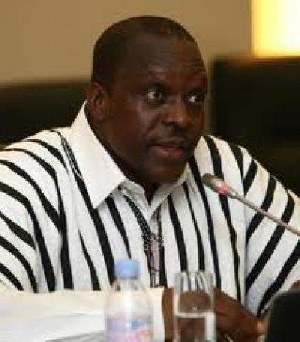The Second Deputy Speaker of Parliament, Alban Bagbin, has described last Friday’s emergency recall of parliament as a confusing spectacle.
This is after the Speaker of Parliament, Aaron Mike Oquaye, set up a five-member adhoc committee to investigate the Minority claims of extortion from expatriates at the presidency, following a petition by the opposition National Democratic Congress (NDC) MPs for a recall of the House.
That move generated a heated debate on the floor of the parliament.
Mover of the motion and Minority Chief Whip, Alhaji Muntaka Mubarak described the move by the Trade Ministry to charge $100,000 from expatriates to sit closer to President Nana Addo Dankwa Akufo-Addo during an awards ceremony as unethical.
But the majority led by its leader, Osei Kyei-Mensah-Bonsu criticised the motion as incompetent and a waste of time.
After the back and forth which led to a suspension of the House at a point to allow the Minority correct some anomalies in their motion, the Speaker constituted a five-member adhoc committee to investigate the matter despite the technicalities and what was described as procedural errors.
Reacting to these developments in an exclusive interview with Class News’ parliamentary correspondent, Ekow Annan, Mr Bagbin, who is the longest-serving MP, said the drama could have been avoided if the MPs from both sides and the Speaker had averted their minds to proper parliamentary procedure.
The Nadowli West lawmaker said: “We just had a debate and there was complete confusion, everything was wrong [from both sides]. The minority requested for a recall. The speaker has no discretion in the matter, it is constitutional. It says the speaker shall recall once we get the 15 percent of members of parliament ascribing their signatures to a paper and that being attached to a notice to you the speaker, it is like a request [that] we want parliament to be recalled for this purpose. The speaker’s hands are tied. It is mandatory.
“When the speaker calls parliament, then you go to the next stage. What is the business? The business committee will have to meet and the business committee will look at that business and schedule it for the meeting of parliament that same day.
“So when parliament meets, yes, you could raise an objection that this is not the type of business that is envisaged by the Article 112 as an emergency item to warrant the recall of parliament and that objection is raised when the member gets up to move the motion. You raise the objection and then the House will now determine whether this is an emergency item worth a recall of parliament to consider that item or this could be considered as part of the normal business of parliament.
“Now, the speaker himself got confused and the request was now not before the House. What was before the House was the motion. And so when the speaker ruled that they should go and amend the request on the flimsy reason that the choice of word ‘we the undersigned’ did not include Muntaka, who signed the memorandum of request, so, they should go and amend that, that also the text has some defects, it was completely a very jumbled ruling with due respect to the speaker.”
General News of Monday, 8 January 2018
Source: classfmonline.com













